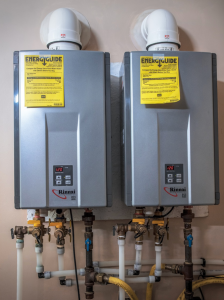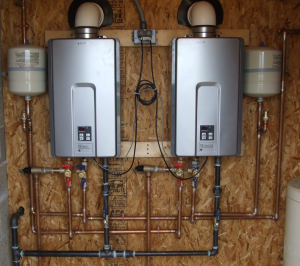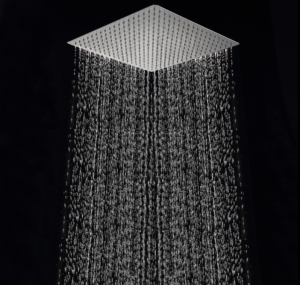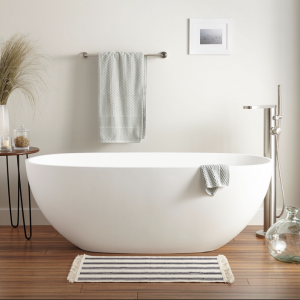
Are you looking for ways to save on your Tampa utility bills? Water heating accounts for around 18% of your home’s energy usage, making it the second-highest contributor to your utility costs after your HVAC system.
If you’re in the market for a new water heater, the best choice for energy savings might be to skip the tank and opt for a tankless water heater this time around. Learn more about tankless vs. traditional water heaters to determine if this upgrade is right for your home.
HOW DOES A TANKLESS WATER HEATER WORK?

Tankless water heaters, also known as on-demand water heaters, generate hot water only when needed. This is different from a traditional storage tank that keeps 40 to 100 gallons of hot water on standby at all times.
With tankless technology, a powerful gas-fired burner or electric unit kicks on when you open a hot water tap. It heats the water directly as it flows toward the faucet, giving you instant access to hot water whenever you want it—no need to store a constant supply.
BENEFITS OF A TANKLESS WATER HEATER

If you have never lived in a house with a tankless water heater before, you might wonder what all the hype is about. Here are the top benefits of tankless water heaters that make them a popular choice among homeowners today:
- Lower energy bills
- Endless hot water
- Longer life span
- Smaller installation footprint
- Reduced flooding risk
WHAT IS THE BEST KIND OF WATER HEATER FOR MY HOME?

A tankless water heater could be an excellent choice if any of the following statements are true:
- My family doesn’t use much hot water. The less water you use, the more you can expect to save by going tankless. Homes that consume 40 gallons of hot water or less per day save 24%-34% compared to conventional water heating. Even if you use more than twice that much, you can still save 8%-14% on your water heating costs.
- I prefer endless hot water over a high flow rate. Tankless water heaters are limited to about two to five gallons of hot water per minute. Traditional water heaters may deliver a flow rate two to three times higher, facilitating multiple hot water activities at once. To combat this shortcoming of tankless technology, consider installing low-flow plumbing fixtures or multiple point-of-use tankless units instead of a single whole-house unit.
-
 I don’t plan on moving anytime soon. Tankless water heaters cost more upfront than traditional tanks, but they deliver monthly energy savings and last twice as long. As a result, you are likely to break even on your investment years before it’s time to replace it. Of course, the only way to make the most of this is if you stay in your current home for a long time.
I don’t plan on moving anytime soon. Tankless water heaters cost more upfront than traditional tanks, but they deliver monthly energy savings and last twice as long. As a result, you are likely to break even on your investment years before it’s time to replace it. Of course, the only way to make the most of this is if you stay in your current home for a long time. - My home is short on storage space. Storage water heaters are around 60 inches tall and 24 inches in diameter, taking up precious storage space. Tankless units measure about 20 inches wide by 28 inches tall by 10 inches deep, or about the size of carry-on luggage. Plus, the unit mounts to the wall, getting it up off the floor. If you own a small condo or townhouse, this size difference could be an added perk to the benefits of a tankless water heater.
SCHEDULE A TANKLESS WATER HEATER CONSULTATION


The experts at Cass Plumbing can help you decide if tankless water heater installation is right for you. We’ll consider all the factors, such as your family’s size and hot water usage, installation limitations, and the payback period of going tankless. With all this information, you can make the best decision for your Tampa home.






